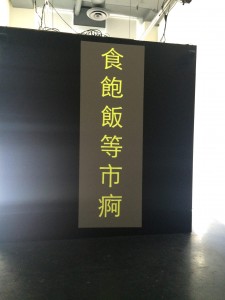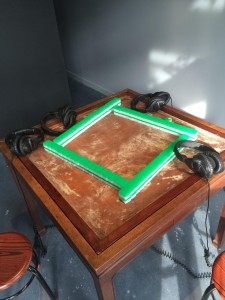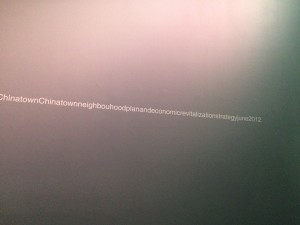The Limits of My Language Are the Limits of My World: A Review of “TRANSGRESSION/CANTOSPHERE”
A found sign greets visitors to Centre A. It reads: “Historic Chinatown.” The Cantonese words “transgression” and “cantosphere” flash over it. Not quite dead yet.
(TRANSGRESSION/CANTOSPHERE), hosted at Centre A gallery between Vancouver’s East Georgia and Main streets, highlights the gradual loss of Cantonese, the traditional language of Vancouver’s Chinatown, to an influx of gentrification and Mandarinzation. Created by Vancouver-based interdisciplinary arts company Hong Kong Exile in collaboration with linguist Zoe Lam and artist Howie Tsui, (TRANSGRESSION/CANTOSPHERE) seamlessly integrates these local changes into a broader discussion of the relationship between cultural/ linguistic hegemony and global market capitalism.
Hong Kong Exile’s brilliant staging sustains a constant interplay between access and alienation. Centre A’s limited floor space lends itself to Hong Kong Exile’s project. The exhibit does not crowd the already limited gallery, poignantly emphasizing the receding availability of space for Cantonese both within Chinatown and globally. To the right of the entrance is a mah-jong table where visitors, using the headphones provided, can listen to Tsui’s frustration as he attempts to correctly pronounce Cantonese words and phrases. An unbroken string of English text is written on the walls framing the back of the exhibit, drawing the Anglophone in only to jar them out of their fluency.
Most of the exhibit is blanketed in darkness, interrupted by the occasional flickering light. Such is the state of Cantonese in Chinatown.

The most visible feature of the exhibit is a literalization of the language barrier: a partial, room-dividing wall upon which a screen showing four-six Cantonese characters is displayed. The characters arrange to form phrases that are suddenly altered by the substitution of one character for another, producing a progression of homophones. These phrases are read aloud by a recording which, beginning with a single voice, crescendos into the din of many, overwhelming the subtle differences in intonation that generate them, thus preventing standardization and repetition. This chorus of voices is an audio sample taken from the Umbrella Revolution. The “pun generator,” which produces phrases both comical and overtly political, speaks to the need for resistance in both the quotidian use of language and in more concerted acts of political organization while accentuating the contextual sensitivity of language and the dangers of rigid normalization.

The screen itself resembles the ubiquitous signs and images that characterize the everyday sensory experience of an urban landscape, inviting Anglophone visitors to consider the linguistic access they enjoy throughout Vancouver. When a Cantonese sign becomes a Mandarin sign, I do not notice. For the Anglophone, this transition, as the result of indifference, is invisible.
As mentioned, the phrases projected onto the screen are puns, a fact I could only attain from soliciting assistance. These puns make the exhibit doubly alienating for the non-Cantonese speaker: they resist meaning at a basic level of understanding (what is being said?), but also frustrate because they require cultural familiarity to be meaningful. An English translation like “The hope is in the human mosquitoes” rejects a need to possess understanding through translation, emphasizing the vanity of a desire for linguistic access while foregrounding the losses incurred through translation. The translation sheets, far from being an act of accommodation, serve as an extension of the exhibit’s linguistic resistance.
(TRANSGRESSION/CANTOSPHERE) successfully interrogates normalization and linguistic imperialism through the invention of a consolidated spatio-linguistic entity. Cantosphere, riffing on a term like “Anglosphere,” articulates a kind of global resistance and collective identity, a form of unification that contrasts with the linguistic fragility of Cantonese itself.
Works Cited
“TRANSGRESSION/CANTOSPHERE.” Centre A. n.p., n.d. Web. 10 Mar. 2015.
